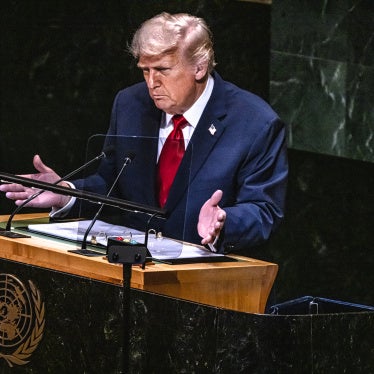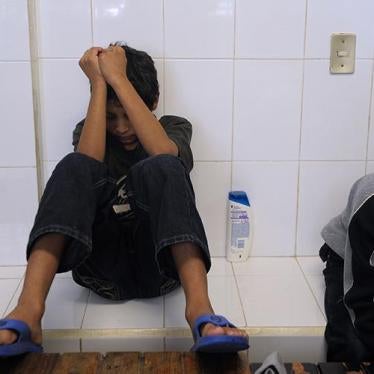Jennifer Daskal, advocacy director, U.S. Program, comments on the United States' Compliance with the ICCPR ito the United Nations Human Rights Committee on March 13, 2006.
I.INTRODUCTION
In the discussion of post 9/11 policies, the United States has repeatedly and publicly stated its view on the applicability – or lack thereof – of the Geneva Conventions to persons detained in connection with its so-called war on terror. It has also, at least until last year’s passage of the McCain Amendment, often repeated the argument that the Convention Against Torture’s prohibition against cruel, inhuman, and degrading treatment do not apply to U.S. authorities acting outside of the United States – an argument that, thankfully, the United States can no longer make.
The ICCPR – and the applicability of rights provided under the ICCPR – are rarely addressed. Instead, the United States has routinely violated fundamental rights under the ICCPR but has not sought to derogate from the treaty. In that regard, Committee has an important role to play in emphasizing to the United States its obligations under the ICCPR – a treaty that the United States has ratified and committed to abiding by both in and out of wartime – and holding the United States accountable for its failures to comply with these obligations.
I refer the Committee to the HRWs submission in September 2005, which outlines in much more detail HRW’s concern about the failure to respect rights protected under the ICCPR. For today’s presentation, I will focus my remarks on three issues: the reliance on diplomatic assurances, secret prisons, and post 9/11 detentions in the United States.
II. DIPLOMATIC ASSURANCES: Violations of Article 2(3) and 7
As the committee is well aware, since 9/11 the United States has frequently sought and received diplomatic assurances from other states that individuals returned or transferred to those states will not be tortured. The executive determines whether the assurances are “sufficiently reliable,” even though the governments from whom such assurances are typically have poor human rights records. We are not aware of any provisions being made for individuals to formally challenge the rendition or transfer on the grounds that the diplomatic assurances are not likely to provide sufficient protections from torture. Despite numerous examples in which diplomatic assurances were secured and individuals were subjected to torture anyway, the United States continues to rely on these unenforceable assurances in violation of its Article 2(3) and 7 obligations.
The most highly publicized case in which this has occurred is that of Maher Arar, a Canadian citizen who was detained by the United States in September 2002. U.S. immigration authorities held him for two weeks, during which time he was unable to challenge either his detention or imminent transfer to a country likely to torture him. Relying on diplomatic assurances from Syria, the United States then flew Arar to Jordan, where he was driven across the border to Syria and detained there for ten months. The United States relied on these assurances despite repeated statements from Arar to immigration authorities that he would be subject to torture if sent to Syria. Arar reports that he was beaten by security officers in Jordan and tortured repeatedly, often with cables and electrical cords, during his confinement in a Syrian prison.
Human Rights Watch (HRW) is extremely concerned about potential for large-scale reliance on diplomatic assurances in the transfer of individuals out of Guantanamo Bay. As the committee is well aware, there is a large chorus of voices in the international community calling for the closure of Guantanamo Bay. The United States has begun making public statements suggesting that they will soon draw down the numbers detained there. In fact, the last round of Annual Review Boards (internal reviews of detainee status in Guantanamo) slated 14 detainees eligible for release and 120 for transfer.
For the reasons submitted to you in our September submission, and for the reasons you will hear about from others today, HRW has numerous concerns about the detention and treatment of the 490 detainees in Guantanamo Bay and supports, in principle, the calls to close this facility. But HRW has serious concerns about the process by which any releases or transfers are carried out. It is not a solution to return detainees to countries where they will be subject to continued arbitrary and indefinite detention, torture or cruel, inhuman and degrading treatment. HRW is particularly concerned that the United States will continue its practice of relying on diplomatic assurances in transferring detainees out of Guantanamo Bay. In order to meet its ICCPR obligations and protect these detainees from torture, there needs to also be a process set up by which detainees can raise claims and seek injunctions against transfers where there is a likelihood that they will be subject to torture.
The creation of such processes is particularly urgent in the aftermath of the passage of court-stripping provisions in the Detainee Treatment Act, which preclude detainees from bringing habeas corpus challenges or any other tort challenge in U.S. federal court. Whereas previous detainees with pending habeas corpus petitions were able to raise derivative challenges to a pending transfer on grounds that they would likely be subject to torture or cruel, inhuman, and degrading treatment, all future habeas petitions are now barred. There is a pressing need to establish alternative processes to ensure that such challenges can be raised and fairly considered.
III. SECRET PRISONS: Violations of Articles 2(3), 7, 9, and 14
The United States continues to hold at least two dozen “ghost detainees” in undisclosed locations. These are individuals who have effectively been “disappeared.” The United States refuses to disclose their fate or whereabouts, does not even acknowledge they are being detained and has repeatedly rejected calls from the International Committee of the Red Cross (ICRC) for access. The only basis for engaging in such secret practices and for refusing even ICRC access is because there is something to hide – presumably torture and abuse. News reports citing current or former intelligence officials and interrogators have confirmed that detainees have been subject to abuse in U.S. custody, and HRW has serious concerns that such secret detentions are gateway to torture and abuse.
IV. DETENTIONS WITHIN THE UNITED STATES: Violations of Articles 2(3), 7, 9, and 10
(1) Special Interest Detainees
HRW documented the roundup of some 752 non-citizens based on alleged immigration violations in the aftermath of 9/11. Three hundred and seventeen were held without charge for more than forty-eight hours; thirty-six were held for twenty-eight days or more without charge; thirteen were held for more than forty days without charge; and nine were held for more than fifty days without charge. One Saudi Arabian detainee was held for 119 days without charge.
Some of these detainees were also subject to extremely abusive conditions -- including particularly egregious conditions at the Metropolitan Detention Center (MDC) in Brooklyn, New York. Subsequent investigations have confirmed that correctional officers “slammed” these special interest detainees against the MDC walls, causing pain and bodily harm. ( See generally U.S. Department of Justice, Office of the Inspector General, Supplemental Report on September 11 Detainees’ Allegations of Abuse at the Metropolitan Detention Center in Brooklyn, New York, December 2003.) Detainees had their fingers and wrists painfully twisted, or their restraints pulled to cause pain and injury to their legs and arms, or were tripped so that they fell to the floor. While several investigations were undertaken, the Department of Justice determined that the evidence was insufficient to proceed with prosecutions. Two of these individuals have sued. The United States recently settled one case, and the other is ongoing.
(2) Material Witness Warrants
Congress enacted the current material witness law in 1984 to enable the government, in narrow circumstances, to secure the testimony of witnesses who might otherwise flee to avoid testifying in a criminal proceeding. Since September 11, however, the U.S. Department of Justice has deliberately used the material witness law for a very different purpose: to secure the indefinite incarceration of those it has wanted to investigate as possible terrorist suspects, in clear violation of Article 9 obligations. HRW has identified at least 70 individuals detained pursuant to this statute. Over one-third were held for several months, a few for six months, and one held for over a year. These individuals were often not notified of the basis of their arrest or given an opportunity to challenge their detention; the arrest affidavits were generally sealed; and the individuals were held effectively incommunicado, sometimes in solitary confinement. The majority were never brought before a grand jury or trial as a witness. Some were, after months in detention, released without charge. Others were charged with minor immigration violations and deported. The United States has apologized to at least 13.
Legislation pending in Congress that would tighten the law to ensure that it is used for the purpose for which intended: to secure the testimony of witnesses. It would set time limits on the length of detention, require that a grand jury or trial be ongoing where testimony required, and incorporate basic due process and fair trial guarantees, including requirement that individuals be provided access to counsel, identified of basis for arrest, and notified of their basic rights.
(3) Enemy Combatant Detentions within the United States
Al-Maari is one of the forgotten victims of the so-called “war on terror.” Al-Maari was in the middle of criminal proceedings, when the United States unilaterally declared him an “enemy combatant,” ended the criminal proceedings, and sent him to a military brig in South Carolina where he has been for almost three years, held essentially incommunicado. His only contact is with his lawyers, who had to sue in U.S. court to get access to their client. The charges against him were based on a single declaration, some of which is classified. Al-Maari’s lawyers are prohibited from sharing the classified portions with al-Maari. Al-Maari is in ongoing litigation challenging the conditions of confinement and lawfulness of detention.
Thank you for your time and consideration. I now want to open this up for questions.







